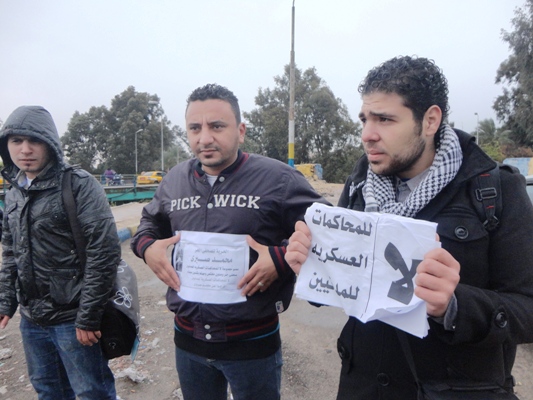Latest NEWS
- Aswat Masriya, the last word
- Roundup of Egypt's press headlines on March 15, 2017
- Roundup of Egypt's press headlines on March 14, 2017
- Former Egyptian President Hosni Mubarak to be released: lawyer
- Roundup of Egypt's press headlines on March 13, 2017
- Egypt's capital set to grow by half a million in 2017
- Egypt's wheat reserves to double with start of harvest -supply min
- Roundup of Egypt's press headlines on March 12, 2017
Significant rise in military trials for civilians after June 30 protests – rights group

Protest against the military trials of civilians on January 9, 2012. ASWAT MASRIYA/ Ahmed Hamed
CAIRO, Jan 18 (Aswat Masriya) – A rights group tracked a significant rise in the number of civilians referred to military trials following the June 30, 2013 protests, said a member of the group on Sunday.
No Military Trials for Civilians, a group campaigning against referring civilians to military tribunals, called on the government to stop the military trials of civilians, particularly students.
Sara al-Sherif, a member of the group, said during a press conference that there is “great difficulty” in obtaining accurate figures on the number of civilians in military prisons.
The number of military trials for civilians decreased towards the end of 2011 and into 2012, as a result of pressure imposed by the media, Sherif said. She added that numbers surged after the 2013 power shift.
Former president Mohamed Mursi was ousted by the military in July, 2013 following mass protests against his rule in June.
Ahmed Shaaban, a researcher at the Egyptian Commission for Rights and Freedoms said the surge in military trials of civilians comes after apresidential decree issued last year which expands the jurisdiction of military judiciary.
President Abdel Fattah al-Sisi issued on October 27, 2014 a new law which refers crimes committed against the state's public and "vital" facilities to the military judiciary.
Shaaban said this law rendered universities equivalent to military facilities.
Earlier on Sunday, the South Minya Prosecution referred 250 defendants accused of assault and vandalism to the military prosecution, as per the new law.
The law was passed shortly after the death of at least 33 security personnel in militant attacks in Sinai. It can apply to cases which have not yet been referred to court, even if the events took place before the law’s issuance.
Article 204 of Egypt's new constitution already allows referring civilians to military trials "in cases which represent a direct assault on armed forces institutions, their camps or anything that falls under their authority, alongside assaults on military or border zones, and military institutions, vehicles, weapons, ammunition, documents, secrets, public funds, or factories."
The article was strongly condemned by civil society organisations and a number of political movements, including No Military Trials, before the constitution passed.










